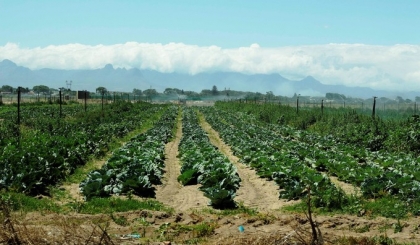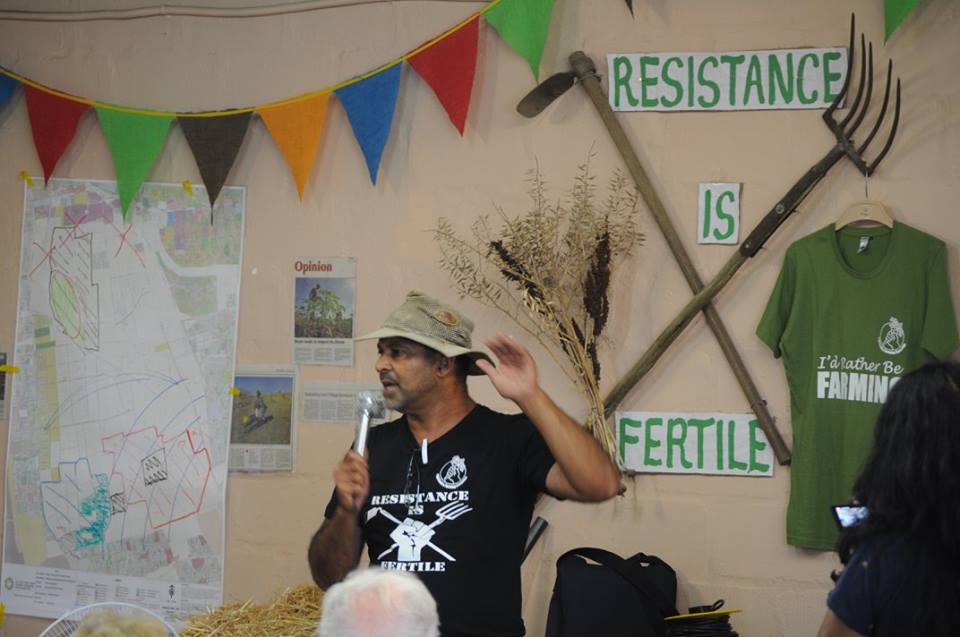The Importance of the Philippi Horticultural Area
- Published:
“I don’t really know why I care so much. I just have something inside me that tells me there is a problem, and I have got to do something about it. I think that is what I would call the God in me.”
– Wangari Maathai
 Photo: Masixole Feni
Photo: Masixole Feni
The Philippi Horticultural Area (PHA) plays an important, if unseen, role for Cape Town yet it has been under threat of development and mining for a long time now. A group of valiant farmers and concerned citizens, led by Nazeer Sonday, in the PHA Food & Farming Campaign, have been standing against these plans for several years. And though keeping the threat at bay for the moment, it will need concerted effort to show for once and for all that the Philippi Horticultural Area should remain untouched by urban development.
The Philippi Horticultural Area spans 3000h in the Cape Flats and has been used for farming stretching back as far as the mid 1800’s because of its mild climate and access to water. At the moment the PHA supplies 80% of Cape Town’s vegetables, sold unlabelled in Cape Town’s supermarkets. But, quite importantly, it also stands as guardian to a fresh water aquifer – the Cape Flats Aquifer – which has been estimated could supply 30% of Cape Town’s potable water.
Much of the 630 square km’s area of the Cape Flats Aquifer is already lying under tar and concrete, therefore it has become essential to keep the PHA undeveloped as this is the last area that water from rainfall can permeate down into the Aquifer and recharge it. A third of the PHA is also a seasonal wetland when it floods in winter and is home to many species of birds, including flamingo.
Even if a small portion of the PHA is developed, it could have dire consequences for the area, as the development plans target the most productive area of the PHA and would affect the Aquifer being able to recharge properly. This in turn poses a threat to all the small farmers in the area, as it is this Aquifer that allows them to grow produce so abundantly - a good 100 000 tonnes per year.
 Nazeer Sonday addresses concerned citizens at the PHA Information day. Photo: Frank Molteno
Nazeer Sonday addresses concerned citizens at the PHA Information day. Photo: Frank Molteno
In mid-February the PHA held an information day to show the public why this area cannot be allowed to be developed. SAFCEI staff attended this event:
“As an environmental organisation we find it alarming that the City of Cape Town can make these decisions knowing clearly what the environmental and economic consequences are. As people of faith we are in full support of PHA to protect the Cape Flats Aquifer and their efforts to challenge the city on their decision making processes. We should always ask the question, in whose interests is the City of Cape Town making these decisions? The PHA is one of the most abundant natural resources areas God has given us and we need to protect it from business opportunists,” says Zainab Adams, SAFCEI’s Outreach Co-ordinator.
Whilst the Phillipi Horticultural Area recently also achieved a victory when Heritage Western Cape rejected the plans of U-Vest Property Group, one of the two development proposals for the PHA, the protection of the PHA has not been secured as the ruling is not binding for the City of Cape Town. The work of the PHA Food and Farming Campaign therefore continues to ensure that the PHA receives permanent heritage protection and we hope that as Earth Keepers, you will stand with them.
How you can support the campaign:
- Sign the petition asking for the long term protection of the PHA: https://secure.avaaz.org/en/petition/The_Western_Cape_Premier_and_Mayor_of_Cape_Town_We_demand_the_long_term_protection_of_the_Philippi_Horticulture_Area/?aWzlMlb
- Spread the word in your faith community – the more visible this campaign comes, the more pressure can be applied to the City of Cape Town
- Keep an eye out for any more PHA Food & Farming Campaign events
Further reading:
Who we are

SAFCEI (Southern African Faith Communities’ Environment Institute) is a multi-faith organisation committed to supporting faith leaders and their communities in Southern Africa to increase awareness, understanding and action on eco-justice, sustainable living and climate change.
Featured Articles
-

South Africa: Who Ends Up Paying If DMRE Cooks the Price of Nuclear Power?
-

South Africa’s nuclear energy expansion plans continue to draw criticism, environmental NGOs chew over legal challenge
-

Earthlife Africa and SAFCEI respond to latest unsettling nuclear news regarding the ministerial determination
-

Open Wing Alliance Africa (Virtual) Summit 2023
-

The Green Connection and SAFCEI respond to energy minister's divisive and deflecting comments
-

Job Vacancy: FLEAT Coordinator







